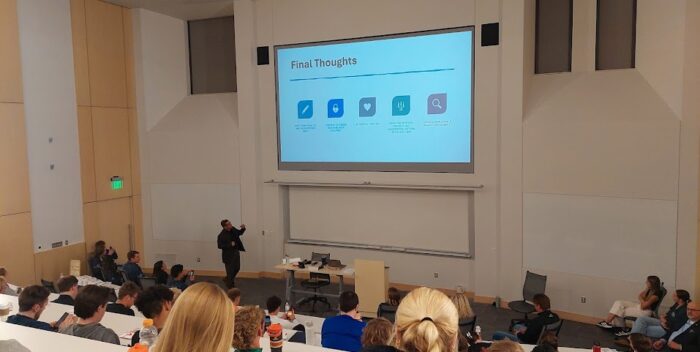Pohlman, Brashear speak on faith, humble leadership at 2024 Leadership and Ethics Symposium
Brent Pohlman gives a presentation to a packed lecture hall at the Leadership and Ethics Symposium on Oct. 8.
Photo credit: Nora Betts
By Nora Betts
Managing Editor
Two business leaders with ties to Concordia told students this week how they have integrated their professional life and their faith and what it takes to be a humble leader.
Brent Pohlman, who graduated from Concordia in 1988 and is owner and chief executive officer at Midwest Laboratories Inc., in Omaha, and local attorney Kurth Brashear, Concordia’s former vice president of Institutional Advancement, spoke to nearly 150 people at this week’s Leadership and Ethics Symposium, which was held at the Dunklau Center for Science, Math and Business lecture hall, which is named after his father, Ken Pohlman, the former owner of Midwest Laboratories.
Pohlman’s presentation “Shining the Light of God” explored how faith fits with his career and his commitment to overcoming self-doubt and building a positive work culture.
“Self-doubt was a big thing for me,” said Pohlman. “I didn’t know if I could do it.”
He overcame his struggle thanks to the advice of a coach. Every time he had a negative thought about himself, Pohlman said his coach made him snap his wrist with a rubber band and write down what he was thinking. Pohlman said he went from reflecting on 35 negative thoughts per day to zero per day, disciplining himself over the course of a month.
Pohlman encouraged the audience to dream big with their professional goals because “with God, there is so much potential.” During his junior year of college at Concordia in 1987, he wrote a paper saying he would work for Midwest Laboratories. Now, nearly 40 years later, he is its owner and CEO, which he attributed to his big dreams and God’s plan.
Pohlman also encouraged business leaders to make personal connections with workers and build a deeper sense of trust and care in the workplace.
“We’ve been taught not to really show our emotions or ask about things, but we really have to connect more with people,” Pohlman said.
Pohlman laid out the three priorities for a successful business: people, process and technology, in that order. He said the desire to implement new technology, including artificial intelligence, should not outweigh a commitment to connecting with people and strengthening workplace culture.
“If you have the best people and you have the best culture, you will go farther and faster than any technology or any process,” he said.
After the event, Pohlman gave out free copies of his 2023 book “Leaders Look Within: Own Your Heart to Lead a Life of Gratitude.”
Brashear, who is an attorney with Rembolt, Ludtke in Seward and Lincoln, discussed what it takes to be a humble leader in his presentation entitled “A Humble Heart: True Leadership.” He listed the five elements of humble leadership as building trust, leading by example, highlighting others, taking responsibility and giving the glory to God.
Brashear said the foundational aspect of humble leadership is trust between the leader and team members. “You have to know the people you are trying to lead, and you have to let them know you,” he said. “If they don’t think you care about them, they will not follow you anywhere.”
He told a story about former Concordia President Rev. Brian Friedrich, who always picked up litter around campus. He said that, like Friedrich, he aims to lead by example because “there is no job on your team that is below you as the leader.”
Senior accounting major Cameron Schroeder said she appreciated Brashear’s point about leading by example because “it genuinely makes sense” from a practical and personal standpoint.
“Why would you lead a team of workers if you can’t perform the jobs that they’re doing?” Schroeder said. “You’re never too good to do the work that your subordinates are doing, but you are good enough to help them do it well.”
Brashear said humble leaders build trust by highlighting the work of others as well as taking responsibility for their own mistakes and the mistakes of their teams.
“Always give credit to others when it succeeds. Always take responsibility when it fails,” Brashear said. “That even means, if you weren’t the reason that it failed and someone on the team you’re leading made a mistake, I’m sorry, but this is how you build trust.”
He said a humble leader should never take sole credit for the success of a team project.
“If you take the credit for [a success], shame on you, because none of us do it by ourselves,” he said.
Brashear said all of his successes during his career in Concordia’s Advancement Office were not his or Concordia’s but God’s. He highlighted God’s work over the course of his life and encouraged others to embrace opportunities and trust in God’s plan.
“My affirmation to my younger self would be, as a person of faith, trust that God is preparing you for the plans He has for you,” Brashear said.
Schroeder said she enjoyed how Pohlman and Brashear’s presentations used faith as the connector between their personal lives and the workplace.
“I feel like both leaders spoke about the same topics, which really can boil down to incorporating your faith and life and trying to be the best person you can be in the workplace and elsewhere,” she said.



















